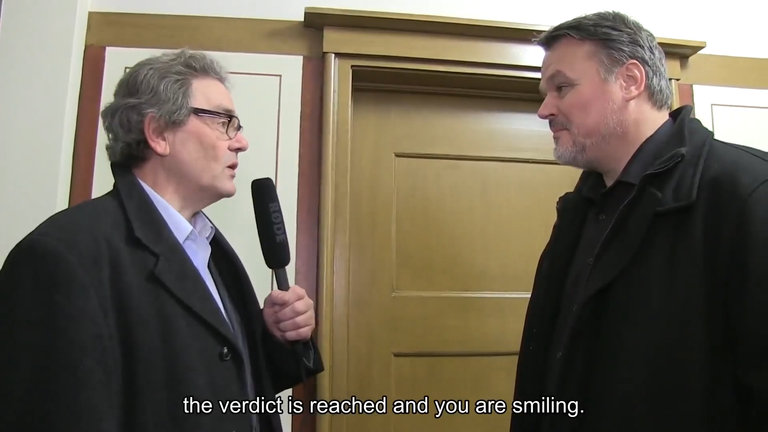Here I will provide an English translation from an audio recording that was made during the measles trial in Stuttgart with Dr. Stefan Lanka, where one can read what the judge said, which is a bit different from what was written down in their ruling. This audio recording was given later to Feli Popescu who was also present at the trial and my translation was made from her Romanian translation of the audio recording, which can be found here.
This is what the judge said, where Popescu also highlighted some parts to better see and understand the importance of the various statements:
"Here we have a public offer of reward (Auslobung) under § 657. The decisive point in which we, the court in Stuttgart, contradict the decision of the court in Ravensburg, is the following: the text of the offer CLEARLY requires a single paper in which the existence of the virus and its diameter is demonstrated.
A public offer of reward is a declaration of intent according to §§ 133, 157 and must be understood as any reasonable person would understand it [!!]. And the starting point of a public offer of reward is the EXACT TEXT. And here in the text it clearly says: "The reward will be paid if ONE scientific publication is provided IN WHICH the existence of the measles virus is demonstrated AND IN WHICH among other things the diameter of this virus is determined".
On the basis of Prof. Podbielski's expertise, the Ravensburg court considered that "OK, nowadays it is no longer customary to publish complete monographs, in which everything (!!!) is proven, but one works on individual points and the combination must be enough (!!!)". This seems at first sight acceptable, but this point of view has a catch, and this catch was for us decisive in giving the verdict: WHERE do we draw the line and WHERE do we stop with the number of publications you are allowed to provide, from the combination of which it can be concluded that there would be a measles virus and how big is it?
You, Mr Bardens, have provided SIX publications. You could have sent 60… or 600… and said, "Look here, in all these papers you'll find proof." For an extreme example, let's say you sent him 100 papers. It's easy to understand that the man didn't ask for this, i.e., to go through 100 papers and get a bullet point from one, a bullet point from another, nothing from another, but then a bullet point from another… and eventually conclude that there's a measles virus.
It is clear from the TEXT of the offer that this was not what was intended, and any reasonable person who had thought carefully about what the author of the offer wanted would have come to the same conclusion. Of course, at first glance, SIX works does not seem like a large number. But it is an arbitrarily chosen number. The author has given a precise task: ONE WORK. If we allow SIX papers, what about EIGHT? What about TEN? You can't draw a line, and this is decisive, the author only wanted one work and therefore he alone decides how and for what he offered to pay.
Dr. Lanka stated from the beginning that the 6 papers do not prove the existence of the measles virus. The idea of a "combination" only emerged when the expert formulated it. The expert said, "In this paper the virus is not demonstrated, in this paper the virus is not demonstrated, in this paper the virus is not demonstrated, BUT in sum, in the totality of all the papers (including those not provided by the petitioner), there is evidence".
Here we already have another problem. Even if we try to take Prof. Podbielski's expertise into account, we do not know which aspects of which papers he referred to as a "combination", in order to consider that the existence of the virus has been proven. The expert's expression is vague and unclear, and it is precisely this vagueness that can be avoided when only ONE WORK is required.
It does not appear from the text of the offer that Dr. Lanka wanted a work by the Robert Koch Institute, nor does it appear that this work should have been published after 1999 or 2002. We did not consider these requests. We, the court, would also accept reviews, or rather, A review, IF - based on X previous papers that did not reach that conclusion, that review would reach the compelling conclusion: here we have a measles virus and this is its size, based on X and Y. BUT WE DON'T HAVE IT HERE.
For these reasons, the court in Stuttgart is of the opinion that the petitioner Dr. Bardens' claim has absolutely no chance. The petitioner's claim is dismissed. The costs of the proceedings for both courts will be paid in full by the petitioner Dr. Bardens."
"As such, the court in Stuttgart made it CLEAR that there is NO evidence of the existence of the measles virus in ANY of the papers submitted. NONE!" - Feli Popescu
